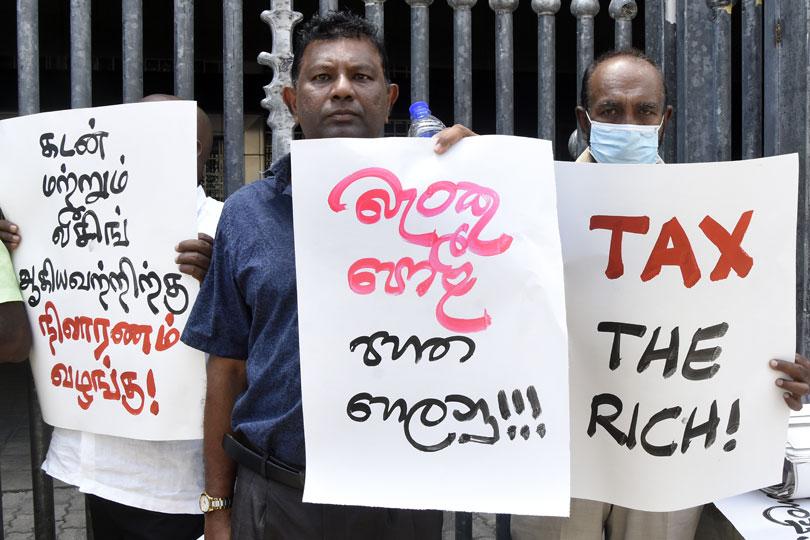Image: Protests against IMF imposed tax are continuing in Sri Lanka.
BENGALURU – Sri Lanka has secured a US$3 billion (S$4 billion) loan from the International Monetary Fund (IMF) to help tide it over its worst economic crisis since independence.
In a televised address on Tuesday, following the announcement late on Monday, Sri Lankan President Ranil Wickremesinghe said: “We’re no longer a bankrupt country.”
Sri Lanka will get the first US$330 million tranche on Thursday.
Nearly a year in the making, the IMF bailout is a lifeline for the bankrupt island nation that has barely any foreign exchange reserves to repay debts running into the billions or import essential food, fuel and medicine.
The country’s economy has been reeling since 2021 under the effects of the Covid-19 pandemic, rising energy prices, corruption and economic mismanagement, on top of populist tax cuts under Mr Wickremesinghe’s predecessor, Mr Gotabaya Rajapaksa. Inflation stands at more than 50 per cent.
Identifying corruption as a key issue, an IMF “governance diagnostic mission” has started assessing Sri Lanka in its first such exercise in Asia, IMF officials said on Tuesday.
Foreign Minister Ali Sabry, who led efforts to get the IMF bailout, told The Straits Times the deal came as a “relief”.
Nevertheless, the IMF fund barely scratches the surface of the island nation’s pending bills.
Sri Lanka’s monthly fuel imports alone range from US$230 million to US$500 million. Its heaviest burden is servicing its outstanding public debt, which stood at US$84 billion in December 2022, according to Colombo-based think-tank Verite Research.
But Mr Sabry said: “The amount of money isn’t important. It will unlock investment from others now.”
The IMF bailout gives Sri Lanka access to US$7 billion, which, apart from the US$3 billion from IMF, will come from institutions such as the World Bank and the Asian Development Bank.
The country’s biggest bilateral creditors – China, India and Japan – have guaranteed support in debt restructuring to Sri Lanka. Mr Sabry said some of the sanitation, water treatment and electrification projects halted by the Japan International Cooperation Agency during the crisis may also resume soon.
The Central Bank of Sri Lanka told ST: “The funds secured through the IMF deal will, first and foremost, be used to achieve debt sustainability, strengthen governance and widen the social safety nets to support the most vulnerable groups in Sri Lanka.”
However, analysts warn that Sri Lanka still faces a tough road ahead.
The IMF programme requires the government to work towards particular targets for economic recovery.
For instance, Sri Lanka must improve its revenue, raise electricity and fuel prices to reflect costs, and offload loss-making public enterprises in the next four years. By 2025, it will also have to institute a property and wealth tax, anti-corruption laws, and recover stolen state assets.
In January, the government hiked income taxes from 18 per cent to up to 36 per cent and raised power tariffs by two-thirds.
“The government’s challenge now is to tackle the social and political consequences of raised prices and job losses,” said Mr Umesh Moramudali, who teaches economics at the University of Colombo and researches Sri Lanka’s public debt dynamics.
Food inflation is at 94 per cent, and the World Food Programme, in its January update, estimated that a third of Sri Lankan households are food-insecure.
“Working and middle-class families now have years’ worth of pending utility bills, defaulted loans and mortgages, assets sold in distress, jewellery pawned, jobs lost, as well as the huge learning loss to children who can’t afford transport to school,” said Ms Iromi Perera, the director of the Colombo Urban Lab, a non-profit organisation that works with poor families.
To have a just and equitable economic recovery process, the Sri Lankan government “must acknowledge the range of hardships people have faced”, she said, adding that the government’s proposed monthly cash allowance of 7,500 Sri Lankan rupees (S$30) for families worst affected by the crisis would be “hugely inadequate”.
Professionals, government employees, doctors, nurses and teachers have been protesting with black bands and walk-outs in recent weeks against income tax hikes.
President Wickremesinghe met union leaders, but his government has faced criticism for quelling protests, with frequent reports of police firing tear gas and water cannon at protesters.
The government also controversially postponed local elections slated for March, citing a lack of funds, claiming it did so on the IMF’s recommendation.
But IMF’s senior mission chief for Sri Lanka, Asia and the Pacific, Mr Peter Breuer, denied this on Tuesday, saying: “We would not interfere in a country’s electoral and governance processes.”
